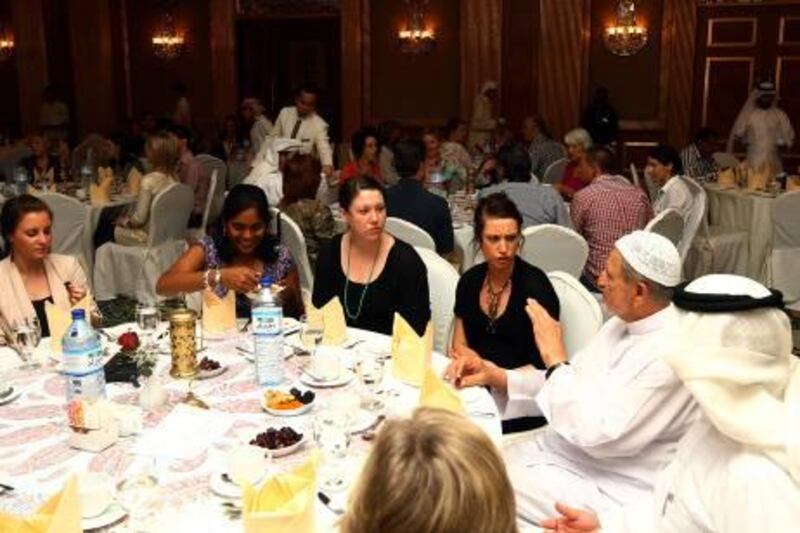SHARJAH // Who is teaching the teachers? In Sharjah this week it was a member of the Ajman Royal Family, who gave new educators in the emirate a lesson in Ramadan at a special iftar this week.
Dozens of new teachers from Australia, Europe and India ate dates and sipped water with their Muslim colleagues, who broke their fast on Thursday evening as part of a programme hosted by the Sharjah City for Humanitarian Services, a non-profit organisation.
An hour-long talk by Sheikh Abdul Aziz bin Ali Al Nuaimi answered a host of questions including the age at which children begin fasting, and why people fast.
He spoke of the importance of engaging with the local community and explained terms such as suhoor and zakat to build awareness among expatriates.
"There is fear of others in the world today; there is a gap between people because of no engagement," said Sheikh Abdul Aziz, popularly known as the Green Sheikh for his environmental advocacy.
"It is important to understand that Ramadan is not just about not eating and drinking, but about restraint, control of the mind and body. It is also important not to drive fast, to get angry. It is about the control of the self."
Like many of the expatriates gathered at the Corniche Al Buhaira Hotel for their first iftar, Eileen Gunn was grappling with the rules of not eating or drinking in public during Ramadan.
"This helped me gain a deeper understanding about Ramadan and realise why it's rude to eat and drink in front of people fasting," said Ms Gunn, 23, a music teacher from Inverness, Scotland, who arrived in Sharjah on Wednesday.
"A lot makes sense now. My body has been in massive shock because of the heat, and when we've gone grocery shopping it's difficult knowing there is a bottle of water but you can't drink it.
"Now I have more knowledge about the beliefs behind Ramadan, I've understood how the faithful are challenging themselves and how it helps to cleanse the soul."
Her Irish colleague Karen O'Brien, 22, who also arrived this week to teach at the Australian International School, Sharjah, said it took a while to remember the little things such as not chewing gum in public.
"It's a new, fresh start so it's great that we have the opportunity to experience new cultures, meet people and understand their beliefs," Ms O'Brien said.
The iftar is in its fifth year and was hosted by Sheikha Jameela bint Mohammed Al Qasimi, the director general of the Sharjah City for Humanitarian Services.
"The iftar is an opportunity for bridging the cultural gap and a way of welcoming newcomers to the UAE with local hospitality, and this can best be done in Ramadan," Sheikha Jameela said.
"I hope this will help some of our guests understand and appreciate their new home, if I may call it so."
Amal Almashaiekh, an Arabic and Islamic studies teacher, enjoyed explaining Ramadan to colleagues at the Victorian International School of Sharjah.
"I tell them it is obligatory, not optional. It is an opportunity for the soul to speak to God," said Ms Almashaiekh, a Jordanian expatriate in Sharjah for 13 years.
"It is a time to pray for peace, love and health. Ramadan is a gift from Allah."
Forgoing water in public was a tough test for Lyn Borger, 50, a teacher from Rutherglen, Australia.
Like her expatriate colleagues at the Victorian School, she has been hopping on to buses, the Dubai Metro and taxis to complete her medicals and buy furniture for her new apartment.
"It's been a challenge since we just arrived," Ms Borger said. "Still, it's interesting seeing a very different side of the UAE - quiet malls, not-so-busy streets during the day and traffic jams at night."
She said the interaction showed the similarities between religions.
"Whether a Christian or a Muslim, it is interesting how religion teaches you to be respectful, understanding and not be wasteful," Ms Borger said.







